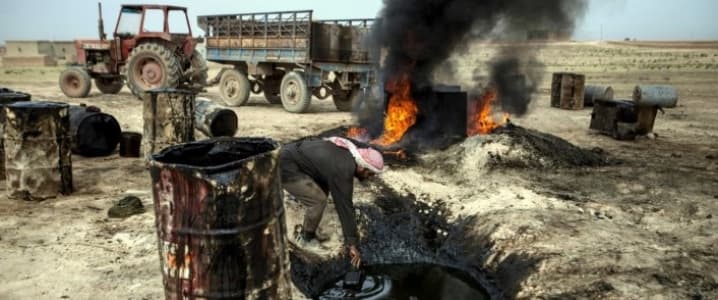Thousands of miles of oil pipelines connect the world’s oil producing hubs to their key customers’ refineries and electrical grids. By replacing trucks, the advent of the pipeline has dramatically reduced the carbon emissions associated with transporting fuel from point A to point B, but their unattended nature makes them an attractive target for thieves who could refine and sell the products for rock-bottom prices on the black market or other illicit venues.
Oil theft has become incrementally more sophisticated over the past few decades as transnational gangs and separatist organizations steal fuel to fund their operations. Deepening geopolitical rivalries amongst states that share pipeline routes also encourage state-backed embezzlement of energy resources. These are their stories:
Nigeria
Nigeria notoriously suffers from oil theft perpetrated by pirates in the Gulf of Guinea, separatist groups in the Niger Delta, and private citizens looking to make a quick buck. In 2016, Michele Sison, the U.S. deputy ambassador for the United Nations at the time, said Africa’s largest producer lost $1.5 billion in revenues every month due to the extensiveness of the oil laundering game across the nation.
Illegal refineries near the Niger Delta allow stolen oil to be processed and used in the local economy, but a new initiative by Lagos would allow the facilities to become legal and secure oil from the government at a negotiated price. Nigeria’s oil minister Emmanuel Ibe Kachikwu advanced the plans last month in order to dissuade locals from attacking oil infrastructure.
A portion of the stolen crude leaves Nigerian borders for processing elsewhere. Evidence from 2014 suggests Nigerian crude had been smuggled into Ghana, mixed with Ghanaian crude before refining and export to Morocco and other European markets for sale on legal markets. Related: Billions In Oil Investments At Stake In Iranian Elections
Mexico
Cartels active in the northern half of this Latin American country are ready to be free from their drug addiction. With a modest upfront capital investment of $5,000 - $8,000, cartels have realized they can tap directly into state-owned gas pipelines and withdraw seemingly unlimited supplies of gasoline, which they then sell along the highway at a discount to official government prices. It's a win-win situation whereby the drug cartels make 100 percent profit margins and citizens get "cheap" fuel.
Last year’s numbers from state-run PEMEX said the nation’s pipeline had been tapped almost 7,000 times in order to supply these illegal markets, which grow in size every year due to heavy participation from ordinary citizens as demand catalysts. The more prolific the fuel thieves become, the more expensive gasoline becomes for legal customers, which only encourages them to become the cartels’ newest buyers. It’s a vicious cycle.
The thefts amount to about $1 billion in losses annually, says Luis Miguel Labardini, an energy consultant at Marcos y Asociados and senior adviser to Pemex’s chief financial officer in the 1990s. “If Pemex were a public company, they would be in financial trouble just because of the theft of fuel,” he said to Zero Hedge. “It’s that bad.”
Azerbaijan
Like Nigeria, groups aiming to steal fuel from this country target crude resources. The criminal organizations that specialize in the practice fill up trucks of the illegally obtained raw goods and transport them to neighboring countries in trucks and trains—which do not have to be searched by customs officers due to the terms of trade agreements with neighboring countries, according to a report by Forbes.
Global Risk Insights notes that almost 60 percent of the Azeri economy operates underground, with untaxed and unregulated oil activities representing a large chunk of the dark underbelly of the national GDP.
Morocco
The border between regional rivals Morocco and Algeria was closed for security reasons in 1994 following an attack on the Atlas Asni Hotel in Marrakesh. Still, thousands of barrels make it across the border on donkeys, according to a report by The Guardian in 2013. That summer, Algerian authorities became resolved to end petrol trafficking on the desert border, resorting to the execution of the animals from a distance. In two instances, donkeys had even been blown up.
Morocco imports the vast majority of its fuel needs, since it has virtually no fuel reserves of its own. The cheap illegal fuel from its neighbor saves Rabat hundreds of thousands of dollars in import costs, so law enforcement turns a blind eye to the smuggling, which occurs far from official checkpoints. Related: Trump-Xi Deal Could Fuel A U.S. LNG Boom
Thailand
The differential between oil and gas prices in Malaysia and Thailand spurs the unauthorized transfer of the former’s fuel via land and sea routes through the Gulf of Thailand. Even after Malay authorities lowered gasoline subsidies, prices remained lower than those in its northern neighbor.
Most of the fuel movement occurs on a small scale in this region. For example, in February, law enforcement near the Thai-Malay border caught three cars with modifications to hold 500 liters of fuel in the vehicle’s bodies.
“Their modus operandi was to fill up petrol at stations near the Bukit Bunga bridge, Tanah Merah, using local vehicles before smuggling them into Thailand,” said the local chief of police. “We believe their activities had been going on for some time. Stern action will be taken against petrol stations found to be in cahoots with smugglers.”
Ships carrying refined oil and gas cargo have the options of selling their goods to other ships at sea. The carriers, most often disguised as fake fishing vessels, bring the remaining fuel to Thai shores, where the traffickers will find dozens of new costumers.
By Zainab Calcuttawala for Oilprice.com
More Top Reads From Oilprice.com:
- Unveiled: Venezuela, Syria’s Secret Scheme To Bypass Oil Sanctions
- Did Saudi Arabia Play Trump?
- Oil Prices Slip On OPEC Deal Disappointment


















